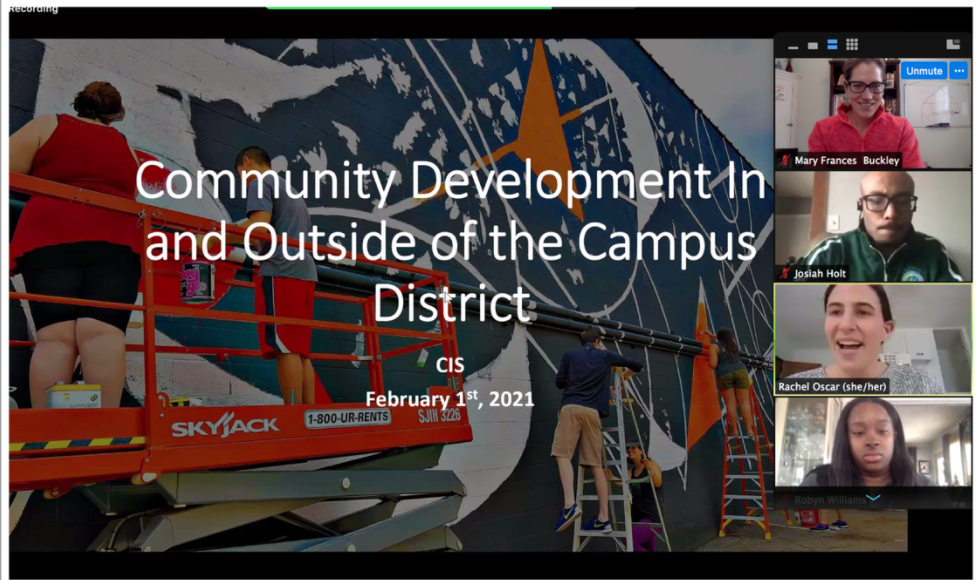Working with Communities for Social Change
A Virtual Conversation with Cleveland’s Campus District
Molly Buckley-Marudas & Angela Fant
In 2020-21, Cleveland Metropolitan School District continued remote schooling and ongoing social distancing requirements were a constant. Given this context, it was a challenge for the YPAR teaching team to imagine how a virtual version of YPAR would be able to cultivate young people’s knowledge of and connection to community issues and challenges. Like all teachers during the pandemic era, the YPAR teachers at CIHS pivoted and, as a result, both imagined and designed new pathways for remote YPAR teaching and learning.

Drawing on the list of topics and community issues that students identified, the YPAR team decided to invite an organization related to every topic on the class list into the Zoom classroom to share their knowledge of specific issues, as well as how their organizations are working to address some aspect of the issue. Although the issues were typically specific to one or two student groups, the team made the decision to have the whole class hear from all the guests. This choice proved to be helpful in that nearly all of the speakers shared something that offered an overarching lesson or cross-cutting idea that was relevant to all students’ thinking about the concept of “community.” In addition, it expanded students’ exposure to other topics and other groups’ research interests. Each guest shared information specific to their organization’s mission and vision, yet every presenter shared something valuable to the whole group. When we reflected on the presentations, we found a series of cross-cutting themes.
In this post, we highlight one of three cross-cutting themes that surfaced from the series of guest speakers who joined our remote YPAR class. This theme was the concept of working with the community. Although this theme was reflected during several presentations, the session with Campus District served as a telling case of this theme. This concept, which is fundamental to Campus District’s work and their approach to urban planning and development, resonates with one of the central tenets of YPAR. A critical Cleveland organization and one of the six original partners in the City is Our Campus project is Campus District.
Campus District was founded in 1983 by three downtown Cleveland anchor institutions that, promote conditions to fuel our vibrant and resilient community. By creating access to better health care, create and build businesses, and enhance education, a better community will exist for those who reside, work, and/or play in Cleveland. During the 2020-21 academic year, we welcomed Rachel Oscar, Director of Programming and Community Engagement, to the CIHS YPAR Zoom room. In keeping with Campus District’s mission, Rachel spent time teaching us how to enact urban planning with the goal of giving people from all places in the neighborhood and all walks of life a place to live, build businesses, produce art, and find access to quality health care. Campus District has provided a unique way of bringing culture, learning, commerce, and passion together. Drawing on the lens of collaboration and working with the community, they have moved many people who live and reside in the Campus District neighborhood to take part in the work and further the vision.
A particularly powerful section of Rachel’s conversation with CIHS youth came when she described asset-based planning and design. Rachel introduced and described two different approaches to planning. One approach portrayed a hypothetical group coming to an urban planning conversation with all the ideas and answers. These individuals saw the problems and believed that they had the solution. The second approach, and the one that Campus District adopts in its work, also started with a community challenge or issue, but the planners created deliberate and explicit spaces and opportunities to learn from current residents and community businesses about their beliefs about the reasons for the challenges and what ideas and recommendations they had for possible solutions or ways to address the issues.
During this session students gained insight into some of the specific ways Campus District has implemented resource-based planning efforts. Rachel and Molly mentioned the work tied to the Payne Avenue Project part of a 2017-2018 YPAR project to help illustrate the collaboration between and among Campus District, Campus International, and a local women’s shelter to beautify a shared street in Cleveland. In the Payne Avenue project, like all their projects, Campus District leveraged their role as urban planners and provided a platform where inclusivity, multiple perspectives, and diversity were embraced. Campus District extended the learning in this virtual space by promoting ways to approach community-engagement for action-based change.
To learn more about Campus District and how you can collaborate in their mission, you can visit their website here.

